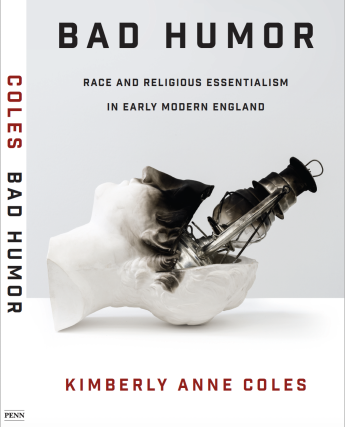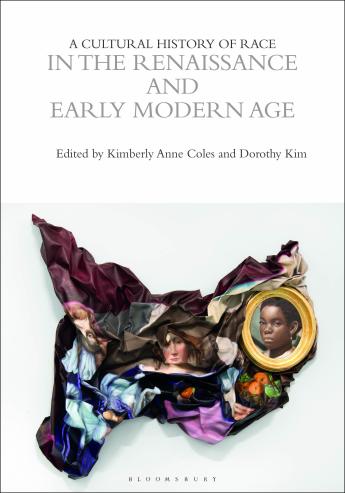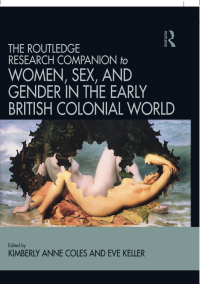Kimberly Coles

Professor, English
The Harriet Tubman Department of Women, Gender, and Sexuality Studies
Classics
kcoles@umd.edu
3105 Tawes Hall
Get Directions
Research Expertise
Early Modern Studies
Literature and Science
Women's Literature and Feminist Theory
Kim Coles has written articles on the topics of race, women’s writing, gender, sexuality, and religious ideology. Her current book, Bad Humor: Race and Religious Essentialism in Early Modern England, emerged from University of Pennsylvania Press in April 2022. The book uncovers how belief itself — the excess, defect, or lack of religion — was largely apprehended and understood in terms of temperament in the early modern period. Race in this period is a concept at the crossroads of a set of overlapping concerns of lineage, religion, and nation. Bad Humor is about how these concerns converge around a pseudoscientific system that confirmed the absolute difference between Protestants and Catholics, guaranteed the noble quality of English blood, and justified English colonial domination. In addition to two monographs, Kim has also co-edited four essay collections and two special journal issues. Her work has been supported by the John W. Kluge Center, the Warburg Institute, and the Folger Shakespeare Library.
Awards & Grants
Folger Shakespeare Library Fellowship
The Folger Institute will offer research fellowships, in the amount of $3,500, to support four continuous weeks of research and writing away from the Folger.
Author/Lead: Kimberly ColesIn their applications, scholars should make a strong case for their proposed topic’s importance, its relevance to a field of study broadly supported by the Folger Library’s collections and programs, and the originality and sophistication of its approach.
Publications
Bad Humor
"Bad Humor" by Kimberly Anne Coles traces the early modern intertwining of race, religion, and nation, revealing how pseudoscientific theories reinforced divisions between Protestants and Catholics, justified English colonialism, and racialized religious
Author/Lead: Kimberly Coles
Race, in the early modern period, is a concept at the crossroads of a set of overlapping concerns of lineage, religion, and nation. In Bad Humor, Kimberly Anne Coles charts how these concerns converged around a pseudoscientific system that confirmed the absolute difference between Protestants and Catholics, guaranteed the noble quality of English blood, and justified English colonial domination.
Coles delineates the process whereby religious error, first resident in the body, becomes marked on the skin. Early modern medical theory bound together psyche and soma in mutual influence. By the end of the sixteenth century, there is a general acceptance that the soul's condition, as a consequence of religious belief or its absence, could be manifest in the humoral disposition of the physical body. The history that this book unfolds describes developments in natural philosophy in the early part of the sixteenth century that force a subsequent reconsideration of the interactions of body and soul and that bring medical theory and theological discourse into close, even inextricable, contact. With particular consideration to how these ideas are reflected in texts by Elizabeth Cary, John Donne, Ben Jonson, William Shakespeare, Edmund Spenser, Mary Wroth, and others, Coles reveals how science and religion meet nascent capitalism and colonial endeavor to create a taxonomy of Christians in Black and White.
Bad Humour: Race and Religious Essentialism in Early Modern England
Philadelphia: University of Pennsylvania Press, Forthcoming
Author/Lead: Kimberly ColesBad Humour: Race and Religious Essentialism in Early Modern England is forthcoming from University of Pennsylvania Press (April 2022). The book uncovers how belief itself — the excess, defect, or lack of religion — was largely apprehended and understood in terms of temperament in the early modern period. Race in this period is a concept at the crossroads of a set of overlapping concerns of lineage, religion, and nation. Bad Humor is about how these concerns converge around a pseudoscientific system that confirmed the absolute difference between Protestants and Catholics, guaranteed the noble quality of English blood, and justified English colonial domination.
Read more about Bad Humor
Race and Religious Essentialism in Early Modern England.
The Cultural History of Race in the Renaissance and Early Modern Age (1350-1550)
Ed. Kimberly Anne Coles and Dorothy Kim (London: Bloomsbury Publishing, 2021).
Author/Lead: Kimberly ColesThrough the lens of critical race theory, the essays collected here explore new analytical models, theoretical frameworks, and methodological approaches in attempting to reimagine the European Renaissance and early modern periods in terms of global expansion, awareness, and participation. Centering race in these periods requires that we acknowledge the people against whom social hierarchies and differential treatment were directed. This collection takes Europe as its focus, but White Europeans are not centered in it and the experiences of Black Africans, Asians, Jews and Muslims are not relegated to the margins of a shared history. Situating Europe within a global context forces the reconsideration of the violence that attends the interaction of peoples both across cultures and enmired within them. The less we are attentive to the cultural interactions, cross-cultural migrations and global dimensions of the late medieval and early modern periods, the less we are forced to recognize the violence, intolerance, power struggles and enforced suppressions that attend them.
Read more about The Cultural History of Race in the Renaissance and Early Modern Age (1350-1550).
"Spenser and Race"
Ed. Dennis Austin Britton and Kimberly Anne Coles, Special Issue of Spenser Studies 35 (2021).
Author/Lead: Kimberly ColesOver the past 30 years, early modern studies has been increasingly interested in the emergence of race as a category of identity, one that could variously demarcate groups of people along lines of lineage, nationality, religion, and skin color. Indeed, the varied usages of the term race in early modern texts makes it rich site for examining the complexity and intersections of early modern embodiment, identity formation, representational practices, and power relations. Scholars have uncovered how early moderns understood the causes of bodily difference—skin color and the multiple valences of complexion, for example—between different groups of people. Studies have examined the extent to which early modern English people understood themselves as distinctive and different from the Spanish, the Irish, Africans, Asians, and others. Attention to the rhetorical strategies used to describe non-European peoples and the uncovering of the material practices of staging non-Europeans in drama, for example, have exposed the role of race in the early capitalist enterprises of international trade and the rise of the commercial theatre. Somatic difference, belief, and lineage are now understood by scholars as establishing moral and religious hierarchies that provided a foundation for justifications of colonial enterprises and the slave trade.
This special issue of Spenser Studies turns its attention to the dark side of Spenser’s imagination. Race is a strategy. It essentializes people as objects or instruments of power relations, and naturalizes political, economic, social, and sexual arrangements. Authors examine racialization in Spenser’s works from various methodological and critical vantage points.
"'Undisciplined': Early Modern Women’s Writing and the Urgency of Scholarly Activism"
Criticism 63.1-2 (2021), 55-61.
Author/Lead: Kimberly Coles"BlacKKKShakespearean: A Call to Action for Medieval and Early Modern Studies"
With immense pain, scholars of medieval and early modern literature, history, and culture have had to acknowledge that our fields of study are not politically neutral.
Author/Lead: Kimberly ColesThe colonial project is stitched in and through the language and literatures of the pre- and early modern periods; the politics and economics that ultimately produced settler colonialism, chattel slavery, the forced migration of peoples, and the development of the British empire animate these early English texts.
Read "BlacKKKShakespearean: A Call to Action for Medieval and Early Modern Studies"
Read More about "BlacKKKShakespearean: A Call to Action for Medieval and Early Modern Studies"
Routledge Companion to Women, Sex, and Gender in the Early British Colonial World
All of the essays in this volume capture the body in a particular attitude: in distress, vulnerability, pain, pleasure, labor, health, reproduction, or preparation for death.
Author/Lead: Kimberly ColesOver the past three decades women’s and gender studies have evolved into disciplines that have energized”and transformed”the study of the early modern period. But the study of women and gender is not the same. As a discipline, feminism begins with the assumption that the sexed body changes the interaction of the subject in political space, regardless of other considerations of subject position. How these other social categories inflect the position of woman as a social actor and political subject does in many ways define the discipline of feminist inquiry, but the sex of the body, irrespective of gender identification, has always informed feminist analysis, which concerns primarily the political uses to which the body is put: in its labor; its social position; its religious identity; its cultural participation. Gender studies, by contrast, typically elides biological sex, inquiring into how gender identity and identification crucially alter social and political engagement, and how gender is imbricated in the social, political and even epistemological arrangements and assumptions of culture.
Now, however, we occupy a historical moment when this disciplinary divide has begun to collapse: when the sex of the body can be altered to adhere to the gender identity of the subject, when calls have been made to appropriate the long-eschewed science of biology for feminist analysis, our thinking about the sexed subject in political space must inevitably change. Our political moment alters our scholarly and theoretical practice. This volume presents a comprehensive examination of the scholarship on women and gender in Anglophone literature during the early modern period. It examines women’s lives, their practical and cultural work, the ideologies of gender that underwrite cultural production, and the divide between ideology and lived experience.
“Gender in the 1590 Faerie Queene,” Edmund Spenser in Context
Edmund Spenser's poetry remains an indispensable touchstone of English literary history. Yet for modern readers his deliberate use of archaic language and his allegorical mode of writing can become barriers to understanding his poetry.
Author/Lead: Kimberly ColesThis volume of thirty-seven essays, written by distinguished scholars, offers a rich introduction to the literary, political and religious contexts that shaped Spenser's poetry, including the environment in which he lived, the genres he drew upon, and the influences that helped to fashion his art. The collection reveals the multiple personae that Spenser constructs within his work: to read Spenser is to read a rich archive of literary forms, and this volume provides the contexts in which to do so. A reading list at the end of the volume will prove invaluable to further study.
Read More about “Gender in the 1590 Faerie Queene,” Edmund Spenser in Context
The Cultural Politics of Blood, 1500-1900
The essays collected here consider how conceptions of blood permeate discourses of human difference from 1500 to 1900 in England and continental Spain and in the Anglo- and Ibero-Americas.
Author/Lead: Ralph Robert Bauer, Carla Peterson, Kimberly ColesThe essays collected here consider how conceptions of blood permeate discourses of human difference from 1500 to 1900 in England and continental Spain and in the Anglo- and Ibero-Americas. The authors explore how ideas about blood in science and literature have supported, at various points in history, fantasies of human embodiment and difference that serve to naturalize social hierarchies already in place. Situating the complex relationship between modern and pre-modern conceptions of race at the junction of early modern medicine, heredity, religion, and nation, The Cultural Politics of Blood challenges established accounts of the genealogy of modern racism.
Religion, Reform and Women’s Writing in Early Modern England
Long considered marginal in early modern culture, women writers were actually central to the development of a Protestant literary tradition in England.
Author/Lead: Kimberly ColesKimberly Anne Coles explores their contribution to this tradition through thorough archival research in publication history and book circulation; the interaction of women's texts with those written by men; and the traceable influence of women's writing upon other contemporary literary works. Focusing primarily upon Katherine Parr, Anne Askew, Mary Sidney Herbert, and Anne Vaughan Lok, Coles argues that the writings of these women were among the most popular and influential works of sixteenth-century England. This book is full of prevalent material and fresh analysis for scholars of early modern literature, culture and religious history





